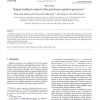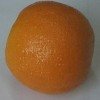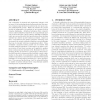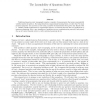56 search results - page 5 / 12 » Linear Scale-Space Theory from Physical Principles |
AUTOMATICA
2004
13 years 6 months ago
2004
Repetitive processes are a distinct class of 2D systems (i.e. information propagation in two independent directions) of both systems theoretic and applications interest. They cann...
ICPR
2004
IEEE
14 years 7 months ago
2004
IEEE
The maximum entropy principle is a cornerstone of FRAME (Filters, RAndom fields, and Maximum Entropy) model considered at times as a first-ever step towards a universal theory of ...
HYBRID
2010
Springer
14 years 1 months ago
2010
Springer
The complexity of physical and engineering systems, both in terms of the governing physical phenomena and the number of subprocesses involved, is mirrored in ever more complex mat...
SCALESPACE
2001
Springer
13 years 10 months ago
2001
Springer
Receptive field sensitivity profiles of visual front-end cells in the LGN and V1 area in intact animals can be measured with increasing accuracy, both in the spatial and temporal...
ECCC
2006
13 years 6 months ago
2006
Traditional quantum state tomography requires a number of measurements that grows exponentially with the number of qubits n. But using ideas from computational learning theory, we...




